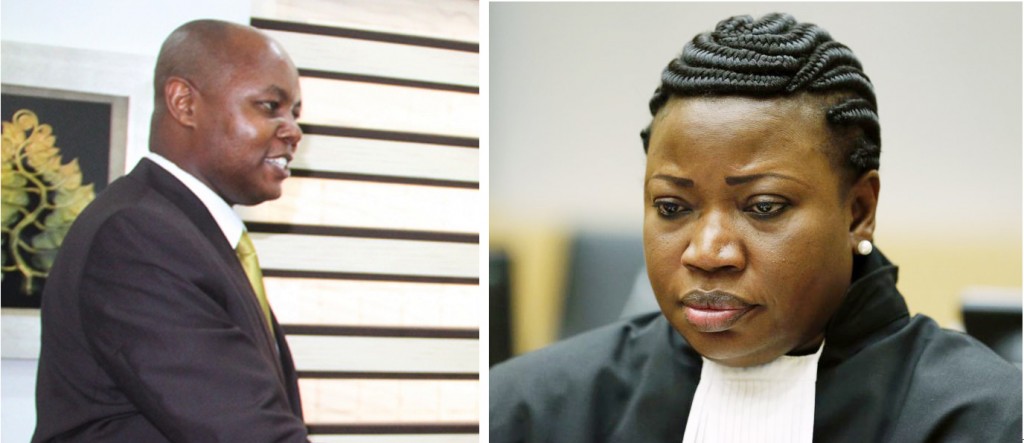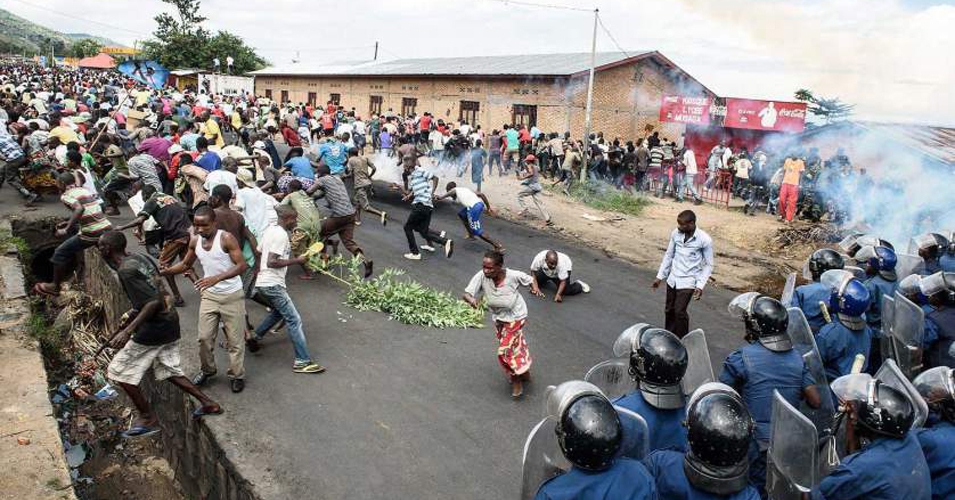
From Left: Acting Burundi Ambassador to Tanzania, Préféré Ndayishimiye, and Prosecutor of the International Criminal Court, Fatou Bensouda.
DAR ES SALAAM: A Burundi diplomat in Dar es Salaam has told a reporter with links to this website, the Burundi conflict last year was partly made worse by irresponsible journalism. The Acting Burundi Ambassador to Tanzania, Préféré Ndayishimiye said journalists exaggerated the gravity of the problem in his country.
Burundi is so much better than was the case in the past, the Acting Ambassador said, which explains why the African Union refused to deploy military units as was demanded by people inclined to ferment the civil unrest in the country.
Ndayishimiye blamed the media for portraying pictures Burundi was in flames when the truth was that it was only pockets of the capital, Bujumbura, where there were isolated incidents of conflict like the burning of tires. The rest of the country was peaceful but the media did not report the peace elsewhere in Burundi.
He also blamed “the opposition”, some aspects of Burundian civil society and some foreign governments of funding demonstrator to foment chaos. Demonstrators were paid allowances with finance from outside the country, he said, although he did not name the foreign country that financed the demonstrators.
He however said there was an African foreign country and another country from outside the African continent who were interested in overthrowing the President and the government. “They have now decided to use the ICC after failing to achieve the overthrow through demonstrations,” he said.
The reporter met the Acting Ambassador to conduct an interview on reports a preliminary inquiry had been started by the International Criminal Court to assess human rights abuses in the tiny East African nation during political violence in 2015.
Ndayishimiye said Burundi does not need intervention of the International Criminal Court (ICC) to resolve its political disputes because it has competent courts, it has competent judges and competent local investigations agencies.
Earlier reports had said the ICC had opened a preliminary inquiry into alleged human rights abuses in Burundi seen by observers, adding that the preliminary inquiry was first step toward a formal investigation into politically induced violence which saw over 430 persons killed, at least 3,400 people arrested and over 230,000 Burundians forced to seek refuge in neighbouring countries last year.

Burundi policemen and army forces face protestors during a demonstration against incumbent president Pierre Nkurunzizas bid for a 3rd term on 13 May 2015 in Bujumbura. In the neighborhood of Musaga, hundreds of people waved sticks and threw stones as police responded with tear gas, a water cannon and live rounds. (AFP/Jennifer Huxta)
“We don’t need the ICC, “the Acting Burundi Ambassador to Tanzania, Préféré Ndayishimiye said during an exclusive interview at the embassy in Dar es Salaam. “Burundi has competent institutions to deal with whatever complaints people may have in the country.”
The ambassador said it appears the ICC has taken the announced step because some people from his country had submitted complaints to the international court against the Burundi government, but added that the right place to submit the complaints should have been the country’s judicial system.
Ndayishimiye said he also wonders why the ICC had chosen this time to start an inquiry when Burundi has been in political problems since 1961. “Why now?” he wondered. “If anybody wants to investigate political violence here they would have to start from 1961. Impunity has been in Burundi for years.”
He said hundreds and hundreds of people died in 1961, in 1965, in 1972 and then again in 1988. Over 300,000 people died in 1972. The situation has improved so much now, he said, explaining that the country was now more integrated than was the case in the past when the army was controlled by one tribe. At present the judiciary is integrated, the army is integrated.
A diplomat from a European Union country had said earlier during an exclusive interview, that he had heard the Burundi Government was not happy with the ICC plan to start a preliminary inquiry which may lead into a full-fledged investigation. The EU country has an embassy in Bujumbura.
The Prosecutor of the International Criminal Court, Fatou Bensouda, had said in an earlier statement: “Since April 2015, I have closely followed the situation in Burundi and repeatedly called upon all involved to refrain from violence, warning that those alleged to be committing crimes falling within the jurisdiction of the International Criminal Court (“ICC” or “the Court”) could be held individually accountable.”
The statement added: “My Office has reviewed a number of communications and reports detailing acts of killing, imprisonment, torture, rape and other forms of sexual violence, as well as cases of enforced disappearances. All these acts appear to fall within the jurisdiction of the ICC. I have decided therefore to open a preliminary examination into the situation in Burundi since April 2015.
“A preliminary examination is not an investigation but a process of examining the information available in order to reach a fully informed determination on whether there is a reasonable basis to proceed with an investigation pursuant to the criteria established by the Rome Statute. Specifically, under article 53(1) of the Rome Statute, the Prosecutor must consider issues of jurisdiction, admissibility and the interests of justice in making this determination. The Office gives due consideration to all submissions and views conveyed to the Office during the course of a preliminary examination, strictly guided by the requirements of the Rome Statute and in the independent and impartial exercise of its mandate.
“There are no timelines provided in the Rome Statute for a decision on a preliminary examination. Depending on the facts and circumstances of each situation, the Office will decide whether to continue to collect information to establish a sufficient factual and legal basis to render a determination; initiate an investigation, subject to judicial review as appropriate; or decline to initiate an investigation if there is no reasonable basis to proceed.
“In conformity with the complementarity principle, my Office will also be engaging with the Burundian authorities with a view to discussing and assessing relevant investigations and prosecutions at the national level,” the ICC Prosecutor has said in the statement.
Asked whether the Burundi Government has blocked the ICC from entering the country, Ndayishimiye said “I have not heard that,” but added: “Burundi will conduct its own prosecutions. There will be discussions among peoples representatives on how that may best be done, but we don’t need the ICC.”
He encouraged any Burundian with a complaint to submit it at the Court of justice and an investigation will be launched to determine validity of the complaint.



